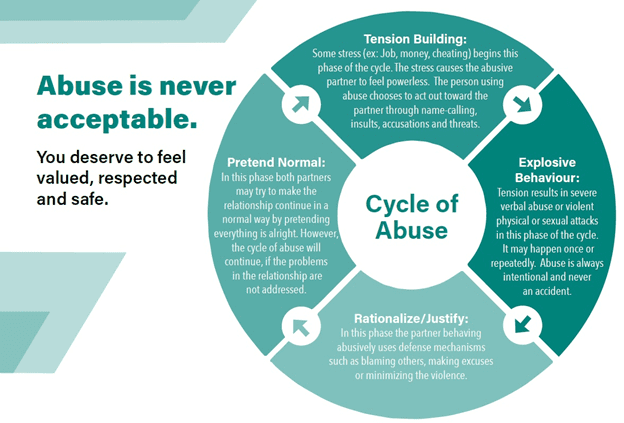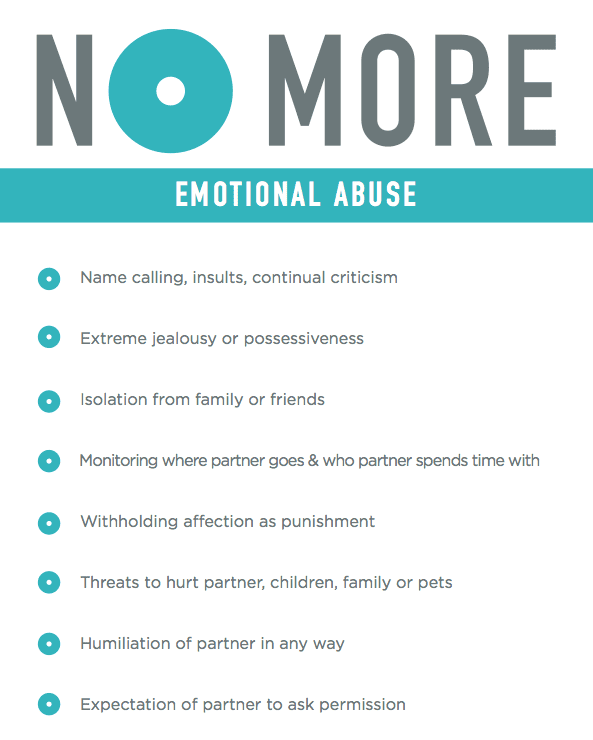Emotional Abuse Definition, Types & Signs
There’s been a lot of talk lately about emotional abuse — what it is, how it shows up, and how to recognize the signs. So, let’s break it down and get clear on what it really means. What is emotional abuse? At its core, emotional abuse is a form of manipulation and control. It happens when someone uses words, actions, or even silence to criticize, shame, blame, or intimidate another person. This isn’t about the occasional argument — we’re talking about a consistent pattern of behavior that chips away at someone’s confidence, self-worth, and mental well-being. In an emotionally abusive relationship, the damage is often invisible — but it’s very real. It can leave someone feeling confused, anxious, and constantly walking on eggshells. Let’s dive deeper into the different types and warning signs so you know what to watch for. If you think that you are a victim of emotional abuse – call the National Dating Abuse Hotline.
Emotional Abuse Definition
Emotional abuse is a way to control another person by using emotions to criticize, embarrass, shame, blame, or otherwise manipulate another person. Emotional abuse includes: humiliating or constantly criticizing a person, threatening, shouting at a person or calling them names, making the person the subject of jokes, or using sarcasm to hurt a person.
Understanding emotional abuse is complicated for many reasons. One reason is that there are several different names used interchangeably to refer to the same kind of abuse, including emotional abuse/violence, psychological abuse/violence, and mental abuse. Another complication is that there isn’t one accepted definition of emotional abuse. It seems that everyone has a slightly different version.
Emotional abuse can feel as destructive and damaging as physical abuse, and can severely impact your mental health. It’s often used as a way to maintain power and control over someone. Emotional abuse may be accompanied by other kinds of abuse: sexual, financial, or physical. However, it doesn’t need to include other kinds of abuse to count as abuse. It’s serious enough on its own to be a concern.
If you feel scared or confused around your partner or doubt yourself when you’re talking with them, you may be experiencing emotional abuse. An emotional abuser’s goal is to undermine another person’s feelings of self-worth and independence. In an emotionally abusive relationship, you may feel that there is no way out or that you’ll have nothing without your partner. Emotional abuse is a form of domestic and family violence.
If you feel you may be in an emotionally abusive relationship, you can do a number of things to get support. It’s important to know that if you’ve been affected by emotional abuse, it’s not your fault and it’s never acceptable. You have the right to feel safe, respected, and supported in your relationships.

Emotional Abuse Types
Emotional abuse can involve any of the following:
- Verbal abuse: yelling at you, insulting you, or swearing at you.
- Rejection: Constantly rejecting your thoughts, ideas, and opinions.
- Gaslighting: making you doubt your own feelings and thoughts, and even your sanity, by manipulating the truth. For more information on how gaslighting works, visit the National Domestic Violence Hotline.
- Put-downs: calling you names or telling you that you’re stupid, publicly embarrassing you, blaming you for everything. Public humiliation is also a form of social abuse.
- Causing fear: making you feel afraid, intimidated, or threatened.
- Isolation: limiting your freedom of movement, stopping you from contacting other people (such as friends or family). It may also include stopping you from doing the things you normally do – social activities, sports, school, or work. Isolating someone overlaps with social abuse.
- Financial abuse: controlling or withholding your money, preventing you from working or studying, stealing from you. Financial abuse is another form of domestic violence.
- Bullying and intimidation: purposely and repeatedly saying or doing things that are intended to hurt you.

Signs Of Emotional Abuse

It is important to understand that there might not be any obvious physical signs of emotional abuse or neglect.
Signs of emotional abuse in adults:
- seem unconfident or lack self-assurance
- struggle to control their emotions
- have difficulty making or maintaining relationships
- act in a way that’s inappropriate for their age.
Signs of emotional abuse in babies and toddlers:
Babies and preschool children who are being emotionally abused or neglected might:
- be overly affectionate to strangers or people they don’t know well
- seem unconfident, wary, or anxious
- not have a close relationship or bond with their parent
- be aggressive or cruel towards other children or animals.
Signs of emotional abuse in older children:
- use the language you wouldn’t expect them to know for their age
- act in a way or know about things you wouldn’t expect them to know for their age
- struggle to control their emotions
- have extreme outbursts
- seem isolated from their parents
- lack social skills
- have few or no friends.
Emotionally Abusive Parents
If you want to save this information but don’t think it is safe to take it home, see if a trusted friend can keep it for you. Plan ahead. Know who you can call for help, and memorize the phone number.
Be careful online too. Your online activity may be seen by others. Do not use your personal computer or device to read about this topic. Use a safe computer such as one at work, a friend’s house, or a library.
The behavior of an emotionally abusive parent or caregiver does not support a child’s healthy development and well-being—instead, it creates an environment of fear, hostility, or anxiety. A child is sensitive to the feelings, opinions, and actions of his or her parents. Emotionally harmful attitudes may include the following.
Showing a lack of regard for the child
This behavior often includes rejecting the child by:
- Not showing affection.
- Ignoring the child’s presence and obvious needs.
- Ignoring the child when he or she is in need of comfort.
- Not calling the child by his or her name.
Saying unkind things to the child
Emotionally abusive parents say things or convey feelings that can hurt a child deeply. Common examples include:
- Making the child feel unwanted, perhaps by stating or implying that life would be easier without the child. For example, a parent may tell a child, “I wish you were never born.”
- Ridiculing or belittling the child, such as saying, “You are stupid.”
- Threatening the child with harsh punishment or even death.
- Continuous verbal abuse.
- Comparing the child to siblings or peers.
- Blaming the child for family problems.
Creating an emotionally unhealthy environment
Some emotionally abusive parents place ill-advised or impossibly difficult expectations on their children, such as:
- Encouraging the child to commit immoral or illegal acts.
- Pressuring the child to grow up too fast.
- Expecting the child to perform beyond his or her capability or maturity.
- Isolating the child from family and friends.
Emotional Abuse: Quotes
“The greater the power, the more dangerous the abuse.”
Edmund Burke
“Abuse if you slight it, will gradually die away; but if you show yourself irritated, you will be thought to have deserved it.”
Tacitus
“You survived the abuse, you’re going to survive the recovery.”
Mariska Hargitay
“The Scriptures have been misused to defend bloody crusades and inquisitions; to support slavery, apartheid, and segregation; to sanction the physical and emotional abuse of women and children; to persecute Jews and other non-Christian people of faith; to support the holocaust of Hitler’s Third Reich; to oppose medical science; to condemn inter-racial marriage; to execute women as witches; to excuse the violent racism of the Ku Klux Klan; to mobilize militias, white supremacy, and neo-nazi movements; and to condone intolerance and discrimination against sexual minorities”
Mel White
“The results of any traumatic experience, such as abuse, can only be resolved by experiencing, articulating, and judging every facet of the original experience within a process of careful therapeutic disclosure.”
Alice Miller
“I think we start suffering as soon as we come out of the womb. I think that people tend to stereotype. When they think of suffering, they think of abuse – physical abuse, emotional abuse, poverty, that kind of thing. There are different levels of suffering. I don’t think that it has to do with how much money you have – if you were raised in the ghetto or the Hamptons. For me, it’s more about perception: self-perception and how you perceive the world.”
Lucinda Williams

Updated 04/03/2025


If you feel you may be in an emotionally abusive relationship, you can do a number of things to get support. It’s important to know that if you’ve been affected by emotional abuse, it’s not your fault and it’s never acceptable. You have the right to feel safe, respected, and supported in your relationships.
- Break the Cycle: Supporting young people between 12 and 24 to build healthy relationships and create an abuse-free culture.
- DomesticShelters.org: Educational information, hotline, and searchable database of services in your area.
- Love Is Respect (National Dating Abuse Hotline): Giving teens and young adults a chance to chat online, call, or text with advocates.
Published: June 28, 2021

Published: January 27, 2026
What Is DPD? Understanding Dependent Personality Disorder
Most people don’t ask, “What is DPD or Dependent Personality Disorder?” They come in feeling drained, anxious, and stuck in relationships that feel restrictive yet hard to leave. Being alone feels unsettling. Decision-making feels paralyzing. Reassurance becomes a daily necessity rather than a comfort. At Overland IOP in Los Angeles, we often see Dependent Personality […]
Read more
Published: January 18, 2026
IOP Program Requirements: What to Expect?
If you’re exploring an Intensive Outpatient Program (IOP), one of the first questions that usually comes up is simple but important: Do I qualify—and what does an IOP actually require? At Overland IOP, IOP is designed for people who need structured, consistent support for mental health and/or substance use—but who don’t require 24/7 residential care. […]
Read more
Published: December 15, 2025
Behavioral Health During the Holidays: Managing Stress, Anxiety & Emotional Triggers
Why the Holidays Are Harder Than They Look? For many people, the holiday season is portrayed as joyful and restorative. In reality, December is one of the most emotionally challenging months of the year, especially for individuals navigating mental health conditions, substance use recovery, or emotional regulation difficulties. According to the National Alliance on Mental […]
Read more
